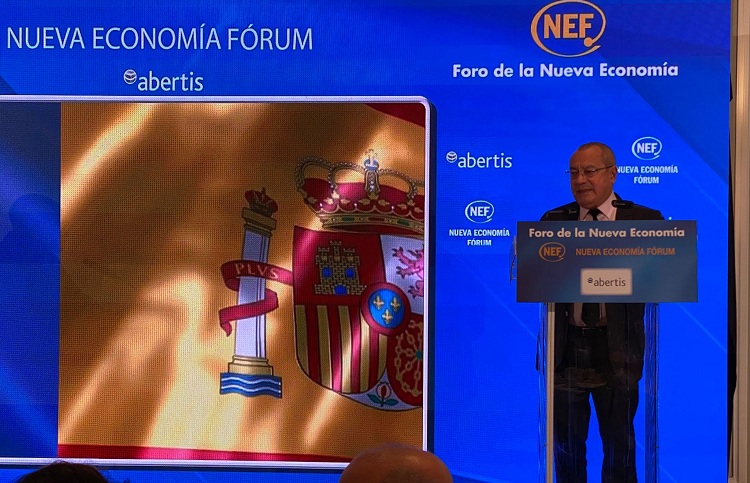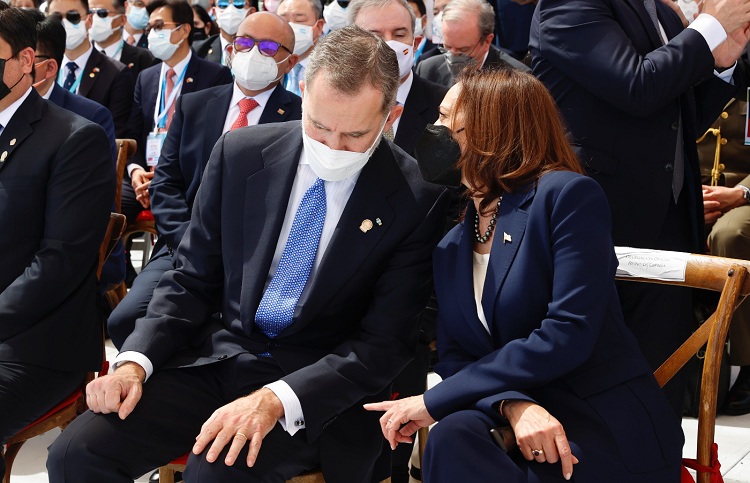The Diplomat
The French ambassador to Spain, Jean-Michel Casa, assured yesterday that the French Presidency of the EU Council wishes to keep “the avenues open for dialogue with Russia” and contribute to “Europe also having its role” in the Ukrainian crisis.
“We are not facing a situation in which the United States or Europe have taken the initiative with aggressive positions,” the ambassador said during a breakfast briefing at the New Economy Forum. “The reality is that it has been Russia that has put forward conditions to the Atlantic alliance and the United States and has deployed thousands of soldiers on the border with Ukraine,” he continued.
According to the ambassador, it is not true that Europe has been left behind in the negotiations on security in the continent, but everything responds to Russia’s usual policy “of favoring dialogue first and foremost with the United States”. For this reason, he assured, the objective of “the entire policy of the High Representative, Josep Borrell, and of the French Presidency is to contribute to Europe also having its role” in this crisis.
“Of course, we are linked to our allies, but the idea is to talk among ourselves in the forums that exist to favor dialogue, as has been being done and will be done in the coming days,” continued the ambassador, who gave as an example the ten-hour meeting held this past Wednesday in Paris by the political advisors of Russia and Ukraine, with France and Germany as moderators, within the so-called “Normandy Format” (which arose following the Russian annexation of Crimea in 2014), whose conclusions, he said, have sent “a positive signal of détente.”
He also reported that French President Emmanuel Macron and Russian President Vladimir Putin will meet today to discuss a plan for de-escalation in the Ukraine crisis and that there is “the likelihood” that French and German Foreign Ministers Jean-Yves Le Drian and Annalena Baerbock will soon travel to Russia and Ukraine to “favor détente, get out of the escalation and enter into the logic of de-escalation.”
“That is fundamentally the policy pursued by Europe through its High Representative and the French Presidency, which is not only to prepare a response to a possible Russian aggression against Ukraine, to prepare sanctions and to favor a policy of deterrence, but also to keep the avenues open for dialogue with Russia,” he added.
Nuclear energy and ETA
On the other hand, the ambassador denied that France defended nuclear energy because it generates “energy independence” and helps carbon neutrality. “All experts know and say very clearly” that it is not possible “to achieve the decarbonization of the European economy with a 2055 horizon without these energies,” he warned. “It is a fully decarbonized energy, which does not produce emissions, cheap, and controlled,” which “gives France independence in relation to supply,” he continued.
Other countries may have “another vision about the future of this energy,” Casa admitted. This is the case of Spain, whose vice-president and minister for Ecological Transition and the Demographic Challenge, Teresa Ribera, he recalled, “has expressed her reticence with regard to nuclear energy, which exists in Spain”. However, he warned, the “paradox” is that the electricity produced by France through nuclear power plants is used in other countries through the European energy network is used in other countries, so “it may be that on several occasions Spain has to buy it”.
Likewise, the ambassador acknowledged that “perhaps” France did not cooperate sufficiently with Spain in the fight against the terrorist group ETA “during the seventies and eighties, when ETA was especially aggressive”, but he recalled that “things changed very quickly at the beginning of the eighties and there was a very clear commitment”.
For that reason, Casa wondered how it is possible that there are Spaniards who still accuse France of having been the “sanctuary” of the ETA members, when since then “there was no more refuge in France for the ETA members”, but an exceptional judicial and police cooperation that allowed “not only to fight the terrorist group ETA” but to put an end to its terrorist activity “forever”. “That was the fruit, of course, of the determined action of the Spanish security forces and the Spanish justice system,” but also “exceptional cooperation between France and Spain in this fight,” he added during the ceremony, which was attended by the Minister of the Interior, Fernando Grande-Marlaska. “If there are people who think this way, they are 40 years too late”, since “the common fight against ETA was decisive for the end of terrorism”, he concluded.
During the presentation of the event, the president of the Congress, Meritxell Batet, said that France is key to the great threats that loom over Europe, not only for its weight in the construction of the EU, but also for its “own pro-European vocation”. She also thanked Casa for its “resounding support to Spain in the diplomatic crisis of the borders of Ceuta and Melilla”.







